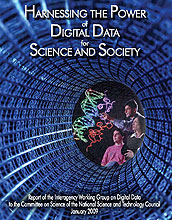News Release 09-048
National Science and Technology Council Releases Strategy for Digital Scientific Data
March 23, 2009
This material is available primarily for archival purposes. Telephone numbers or other contact information may be out of date; please see current contact information at media contacts.
The National Science and Technology Council (NSTC) released a report describing a strategy to promote preservation and access to digital scientific data. The report, Harnessing the Power of Digital Data for Science and Society, was produced by the NSTC's Committee on Science under the auspices of the Office of Science and Technology Policy (OSTP) in the Executive Office of the President.
The open and timely publication of digital scientific data called for in the report will advance President Obama's plan to democratize data by publishing government information online in forms that the public can readily find and use. OSTP, which is implementing the President's agenda on transparency and open government, in collaboration with the CIO Council, is working to create a central, online repository--data.gov--where the public can download such information in open, structured formats. The report provides a strategy to ensure that digital scientific data produced by and for the Federal government and made available via data.gov and agency websites can be reliably preserved for maximum access in catalyzing progress in science and society.
Digital imaging, sensors, analytical instrumentation and other technologies are becoming increasingly central to all areas of science. Increases in computing power drive advances in modeling and simulation that extend the reach of science. Improvements in networking increase access to information, instrumentation, and colleagues around the globe. Digital data are the common thread linking these powerful trends in science.
"Science and engineering research and education are increasingly digital," said Arden L. Bement, Jr., director of the National Science Foundation and co-chair of the Committee on Science. "New observation systems are prime examples, expanding the scales for conducting observations from the sub-atomic to the cosmic; from a billionth of a degree to millions of degrees; and from sub- picoseconds to light years. A broad framework for promoting continuing access and interoperability for scientific data is key to progress in this digital age."
The report lays out a strategic vision for "a digital scientific data universe in which data creation, collection, documentation, analysis, preservation, and dissemination can be appropriately, reliably, and readily managed, thereby enhancing the return on our nation's research and development investment by ensuring that digital data realize their full potential as catalysts for progress in our global information society."
The report includes three key recommendations to pursue this vision. The first is to create an interagency subcommittee under NSTC that will focus on goals that are best addressed through continuing broad cooperation and coordination across agencies. The second key element of the strategic framework is for departments and agencies to lay the foundations for agency digital scientific data policy and make the policy publicly available. In laying these foundations, agencies should consider all components of a comprehensive policy to address the full data management life cycle. The third key element is for all agencies to promote a data management planning process for projects that generate scientific data for preservation.
The report represents the combined effort of representatives from 22 federal agencies working together under the Interagency Working Group on Digital Data. The report may be found at http://www.nitrd.gov/About/Harnessing_Power.aspx.
About the National Science and Technology Council:
The National Science and Technology Council (NSTC) was established by Executive Order on Nov. 23, 1993. This Cabinet-level council is the principal means for the President to coordinate science and technology across the diverse parts of the Federal research and development enterprise. Chaired by the Director of the Office of Science and Technology Policy (OSTP) on behalf of the President, the NSTC membership consists of the Vice President, Cabinet secretaries, agency heads with significant science and technology responsibilities, and other White House officials. An important objective of the NSTC is the establishment of clear national goals for federal science and technology investments in areas ranging from information technologies and health research to improving transportation systems and strengthening fundamental research. The council prepares research and development strategies that are coordinated across federal agencies to form investment packages aimed at accomplishing multiple national goals.
-NSF-
Media Contacts
Dana Topousis, National Science Foundation, (703) 292-7750, email: dtopousi@nsf.gov
Program Contacts
Chris Greer, Networking and Information Technology Research and Development Program, (703) 292-4873, email: greer@nitrd.gov
Related Websites
Report: Harnessing the Power of Digital Data for Science and Society: http://www.nitrd.gov/About/Harnessing_Power.aspx
The U.S. National Science Foundation propels the nation forward by advancing fundamental research in all fields of science and engineering. NSF supports research and people by providing facilities, instruments and funding to support their ingenuity and sustain the U.S. as a global leader in research and innovation. With a fiscal year 2023 budget of $9.5 billion, NSF funds reach all 50 states through grants to nearly 2,000 colleges, universities and institutions. Each year, NSF receives more than 40,000 competitive proposals and makes about 11,000 new awards. Those awards include support for cooperative research with industry, Arctic and Antarctic research and operations, and U.S. participation in international scientific efforts.
Connect with us online
NSF website: nsf.gov
NSF News: nsf.gov/news
For News Media: nsf.gov/news/newsroom
Statistics: nsf.gov/statistics/
Awards database: nsf.gov/awardsearch/
Follow us on social
Twitter: twitter.com/NSF
Facebook: facebook.com/US.NSF
Instagram: instagram.com/nsfgov



